As part of CommCorp’s Healthcare initiatives, 这 数字创新与终身学习 (DILL) program provided funding to Holyoke Community College (HCC) to partner with local healthcare employers in designing and delivering a competency-based program to prepare entry-level healthcare workers for career advancement. The program achieved great success, propelling individuals from what may have been jobs with little chance for advancement into new journeys in the medical field.
Sharon Grundel, Healthcare Program Coordinator for HCC’s Pharmacy Training, says this was an outstanding upskilling opportunity for individuals who were part of the healthcare system but working in non-medical areas of the hospital, like food service, environmental services, patient support, and transportation.
“It’s been life-changing for a number of people who never saw themselves in these roles,” says Grundel.
“It has truly opened opportunities, doors, and career ladders for people who did not know they existed. They now have a new sense of confidence about themselves, and it’s been remarkable.”
HCC partnered with area hospitals Baystate Health 和 Holyoke Medical Center to recruit incumbent workers as program participants. The community college also joined forces in this effort with Western New England University (WNEU) in Springfield, where students sat in state-of-the-art labs to receive hands-on training. Real-world applications were applied in the program as participants were instructed by pharmacy professors – receiving similar instruction as bachelor-level pharmacy students.
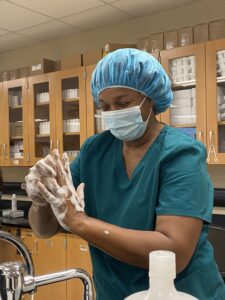
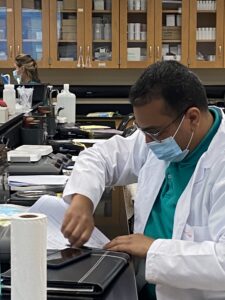
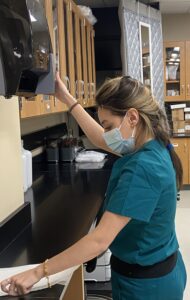
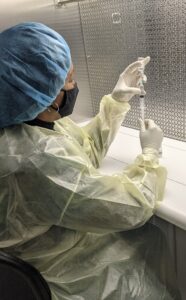
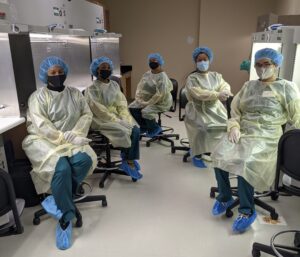
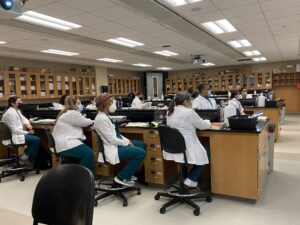
Through the $227,000 DILL grant, 20 participants completed the program to become pharmacy technicians — a current high-demand healthcare job. In fact, according to the U.S. Bureau of Labor Statistics, employment for pharmacy technicians is expected to grow by seven percent from 2018 to 2028. The Bureau estimates 43,500 openings for pharmacy technicians projected each year over the decade. Many of those openings are expected to occur from the need to replace workers who transfer to different occupations, retire or exit the labor force.
Josh Novak, Workforce Planning Partner at Baystate Health, says the hospital has seen an increased need for more pharmacy technicians, and finding licensed individuals can be challenging. Novak says this partnership not only allowed them to meet the need to fill some of those openings but has had a tremendous impact on their team. “I get emotional thinking about it because the results have been tremendous, says Novak, “This allowed an opportunity for folks to take the next steps in their career and explore a career pathway without having to go throw loopholes. It was life-changing; programs like this one allows our community to live better lives, manage rents, and give them a chance to gain competency in the job market. This gives our employees a new outlook in their careers and has helped them see their potential.”
"This gives our employees a new outlook in their careers and has helped them see their potential."
-Josh Novak, Workforce Planning Partner at Baystate Health
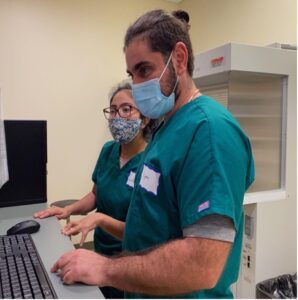
Before completing the program, 24-year-old Lizbet Borrayes was a housekeeping staff member at Holyoke Medical Center; now, she is a pharmacy technician and is pursuing new dreams for herself and her two years old daughter. “This program helped me to realize I can grow and keep going in life,” says Borrayes. “I am now able to provide for my family as the oldest daughter. This new job has made me feel like I can do more in my life.”
Borrayes went on to enroll and complete an English as a Second Language program at Springfield Technical Community College and is now working towards an Associate in Science in Civil Engineering Technology at the same institution. This new outlook has had a ripple effect among participants like Tigran Grigoryan, who says this propelling has made him feel like he’s getting a second chance in life,
The Armenia native arrived in Massachusetts four years ago. In his native country, Grigoryan owned an electrical business for nearly eight years, and just before moving, he was a manager at a security company. At Baystate, he started as a periderm phlebotomist before participating in the program; now, he is exploring a long-term career in healthcare and even considering nursing school. “I never imagined a career in the hospital field,” says Grigoryan. “The program was great and very organized. I met a lot of good people, and it helped me to learn more English. This is a very good career. I like the environment and the work I do.”
That’s the kind of impact they hoped to have, says Kermit Dunkelberg, Assistant Vice President of Adult Education and Workforce Development at Holyoke Community College. “This training provided huge growth opportunities because it’s a medical career track,” says Dunkelberg. “This creates pathways into the medical field that brings them into increasing their wages.”
Training as a pharmacy technician requires a different skill set. Partners worked with national consultant, C-BEN, to design a new curriculum based on Pharmacy Technician Certification Board (PTCB) competencies. The carefully curated curriculum included essential competency areas such as the compounding of sterile and non-sterile medications, quality and safety principles in patient care delivery, and soft skills like professionalism and practice. At WNEU, students received hands-on experience in their College of Pharmacy and Health Sciences.
“Partnering with area institutions has always been an important part of our mission here at Western New England University,” says Melissa Mattison, Assistant Dean for Experiential Affairs and Clinical Associate Professor at WNEU. “For us, it was an exciting opportunity to participate in the DILL program, help shape the future of pharmacy technicians in Western Massachusetts and address the continuing need for qualified pharmacy technicians. We look forward to future collaborations.”
HCC says the program continues with a relaunch this spring. “And we could not have done it without Commonwealth Corporation, which serves an important role in funding innovative workforce development resources,” said Dunkelberg.
Out of twenty participants, ten went on to obtain their national certifications as pharmacy technicians, including Grigoryan. Following their commitment to offering pharmacy technician positions, healthcare institutions rewarded participants with average wage increases of $4/hour and $4,000 retention bonuses.
This is one of three DILL grants launched in the Spring of 2021. UMass and Westfield State University received funding to partner with local healthcare employers to design and deliver training for medical office Practice Assistants (UMass) and Certified Alcohol and Drug Abuse Counselors (Westfield).
